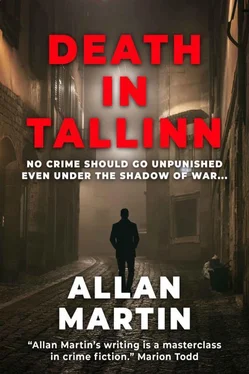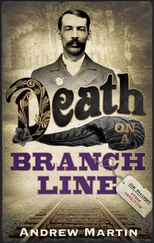“So you and your thugs killed Vaher,” said Hallmets clamly, “Because he loved his country more than your maniac scheme.”
“He was pathetic,” sneered Albrecht, “Countries, nationalities, they’re all finished now. The new man is bigger than all that. He makes his own destiny, through the power of his will. He dominates, he seizes opportunities, he builds his own world, moulds the lives of others, makes them part of his universe. Who are the Estonians in the face of that? An insignificant race which we will supersede and transcend.”
“Hiding in a clothes-chest doesn’t sound very transcendent. The game’s over now.”
“You think I’m done here, Hallmets. Let me explain something. In one minute you and the woman will be dead. Then I’ll go out the back door and slip away. I’ve got my diplomatic badge and my car’s not far. I’ll back in the embassy in half an hour.”
“Be a man and a von Langenstein, Albrecht,” wheezed Heinrich. “Stand up and tell the truth. It’s all over. Then you can flash your badge and scuttle back to your hideout.”
“You don’t understand, do you, my stupid big brother. History has left you behind. The future belongs to me. Too bad you won’t see it. I’ve been wanting to do this for thirty years.” He shot Heinrich in the head. Blood and brain sprayed out the back of his skull onto Laura’s lap. She looked at her bloody hands, then screamed. A long, terrible scream of rage and despair and loss. The sound of it filled the room, echoed from the walls, pressed at the windows, so that the drapes on either side seemed to shiver.
“Shut up, you stupid bitch!” yelled Albrecht, and fired a shot in her direction, as if to make his point. It caught her on the shoulder and spun her off the couch. She tumbled onto the floor in a heap. And stopped screaming.
But the noise had done its job. Footsteps could be heard in the next room. People had evidently come up the main staircase. Probably the medics with a stretcher for Heinrich. Someone tried the door, shook it.
“Shit,” muttered Albrecht. He stared for a moment at Hallmets. “I’ll get you two later, you have my word on that.” And he ran to the door at the other end of the room, the one Hallmets had entered some fifteen minutes earlier, flung it open, dashed through and slammed it behind him.
Then a familiar voice. “Police, stop!” And a shot. And two more shots. And two more.
The door opened again.
“Who the hell was that?” said Kadakas. “I had to shoot him, he tried to kill me.”
65
There was a lot of activity at the Heinaküla estate. Ambulances ferried the dead and injured away. Among the latter was Albrecht von Langenstein, wounded in his left thigh and right shoulder. Kadakas has shot him in the leg first, but von Langenstein had continued shooting, and the lieutenant had no alternative but to shoot him again. He himself suffered only a flesh wound in one arm.
All sorts of people now turned up at Heinaküla Manor. Police were searching the grounds and every building for further evidence. Officials from the internal revenue service came to examine the distillery and impound the stocks of vodka and brandy. A couple of army officers came to look at the weapons found in the crates. They were hoping the army would ultimately get them.
Among the first newcomers was Jaan Kallas. Hallmets had phoned Kallas as soon as he could, before anyone could tell him not to. He gave Kallas an interview, focusing on the discovery of the distillery and the smuggled weapons. He declined to comment on what had taken place within the manor house, or on the role of the von Langensteins, knowing that Kallas would draw his own conclusions. Tõnu the photographer was invited to take shots of the distillery equipment and the stores of illegal alcohol.
Captain Lind arrived to receive Hallmets’ account of the matter and to congratulate him on tying up the Vaher case. As he said goodbye to Lind at the main door of the manor house, Hallmets noticed the captain’s driver loading some crates into the car. “Spoils of war,” said the captain, looking guilty, “The revenue people will only pour it away. Terrible waste of good vodka. I’ll send you over a few bottles.”
An hour later, he retold the story to Colonel Reinart.
“Very neatly done, I must say, Chief Inspector,” said Reinart, smiling, “So it turns out the whole thing was about illicit alcohol production, and the resentment of a few members of the former ruling class. And Vaher was killed by hirelings of the ex-Baron, led by Schriff. All of whom died in the raid today.”
“What about the German connection? Schriff was a member of the Nazi party.”
“How many Germans do you think belong to the party? There are bound to be some bad eggs.”
“We still have Albrecht von Langenstein. Hopefully he can be questioned.”
“Oh, didn’t I mention it? He passed away in the ambulance, on the way to hospital. One of my people was there with him. Wounded in three places, he didn’t have much chance.”
Hallmets said nothing. He knew how many times Albrecht had been wounded.
“It’s just as well, really,” the Colonel continued, “After all, he was a diplomat, and we’d never have been able to question him, let alone put him on trial. He’d have been back in the Reich in no time. We’ll have to say that Albrecht knew nothing about the alcohol business. It was unfortunate that he arrived, purely to see his brother and sister, and quite by chance, in the middle of the raid and got caught in the crossfire. He must have taken a short cut from his car across a field, so that the police didn’t spot him, or they would naturally have warned him off.”
“What about the weapons? How are you going explain them away?”
“Obviously we can’t reveal their plans for a seizure of power. That might put ideas into too many people’s heads here. So we say the weapons were also part of the smuggling operation. They were to be sold on at a big profit to any government which would pay for them. They might even have been sold to our own army!”
“And Krummfeldt?”
“He claims he didn’t realise his crates were being used by the smugglers. It would be very difficult to prove anything against him. His factory is important to our economy. But it’s been suggested to him that he steps back from personally managing the plant, and takes himself to another country for a few years.”
“So everything is nicely sewn up?”
“Your job is to solve the crime, Hallmets. Mine is to manage the political fallout, and make sure our country stays in one piece. Sometimes the narrative has to be massaged. We simply can’t afford to fall out with Germany. That’s the reality of where we are. Estonia is like a weasel in a bearpit – we just have to keep out of the way of the bears, and hope they don’t take too much notice of us.”
Hallmets sighed. “Yes, I understand. The only loose end that remains then is Lepp. The baron made it clear to me that he was involved in Vaher’s death.”
Reinart sighed. “Yes. Tucking him away in a backwater is not an option now. I sent someone round to his place but he’d already flown the coop. But we’ll be keeping an eye out for him, and when we catch him, he’ll get what’s coming. By the way, the press haven’t been here, have they?”
“I’m afraid so. Kallas turned up.”
Reinart wasn’t pleased. “Dammit! How the hell did he find out?”
“Didn’t you notice as you came in. The place is swarming with people. Any one of them could have fancied a few crowns for the tip-off.”
“Did you give him an interview?”
“Yes, I think it would have been worse not to, otherwise he’d just wander around and speak to anybody. I focused on the distillery. But soon they’ll all be here.”
Читать дальше












